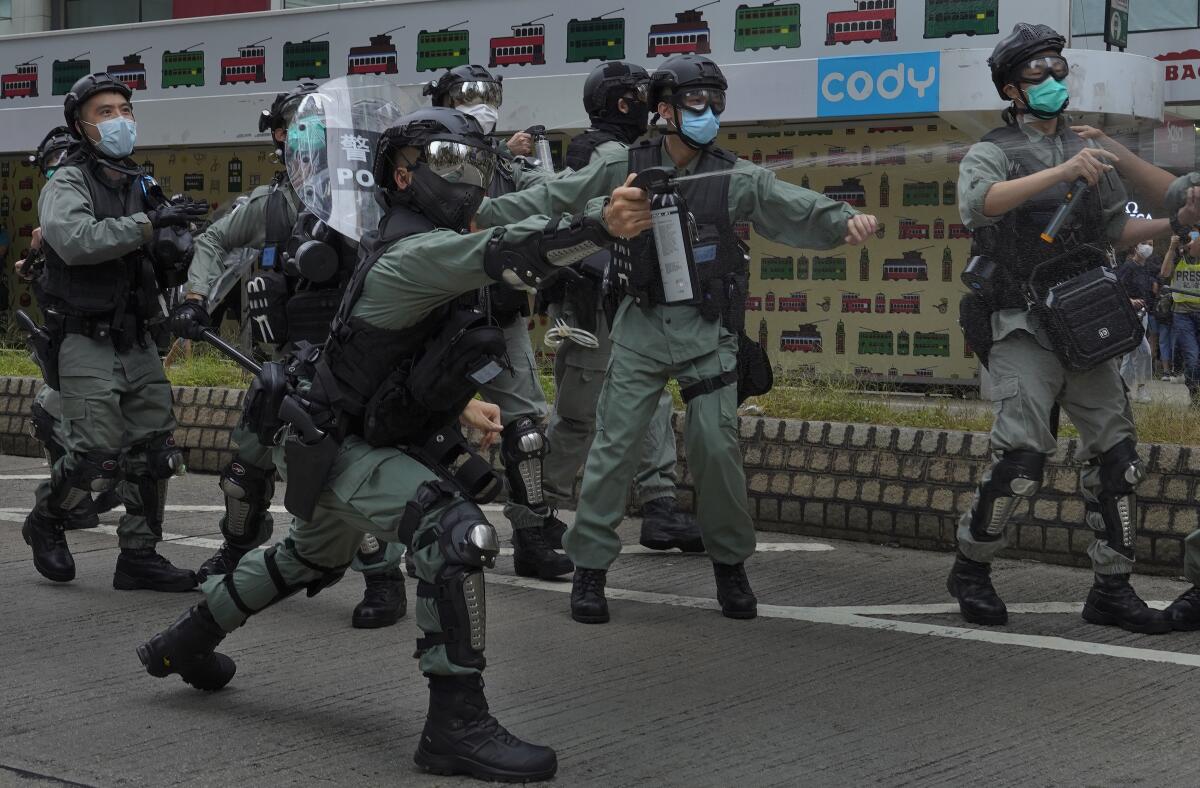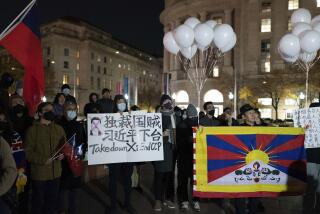Op-Ed: Hong Kong is the front line of a new cold war. If it burns, the world gets burned too

HONG KONG — Just as Hong Kong begins to see some hard-won respite from the coronavirus, a potentially more deadly political virus from Beijing has barged in with full force.
The National People’s Congress has passed a resolution to impose a National Security Law on Hong Kong, in clear violation of the city’s mini-constitution requiring the law be enacted by the local legislature. The proposed law prohibits “acts of secession, subversion, terrorism or conspiring with foreign influences,” all expansive categories and arbitrary words in the Chinese Communist lexicon. Mainland Chinese security agents may implement the law in Hong Kong, banning organizations and imprisoning individuals deemed threats to national security.
In response, the Trump administration’s declaration that Hong Kong is no longer autonomous from China will likely lead to the elimination of trade and customs privileges. Other world leaders have signed joint statements expressing deep concerns that the new security law will mean the end of Hong Kong as a global financial hub because the “one country, two systems” framework will likely crumble.
With this latest move, on the heels of brutish assaults on key institutions of Hong Kong society — its education systems, media, legislature, elections and judiciary — Beijing sends at least two messages. To its own people, the Communist Party shows its iron will to quell dissent at all cost, especially when the Chinese economy faces the most serious headwind in decades. Six months of energetic mass defiance under its nose is very difficult for the Communist regime to stomach.
Hong Kong has an outsized effect on mainland Chinese when it comes to citizens’ protests. In the last decade, public marches have been a popular item on the unofficial itinerary of millions of Chinese tourists flocking to the city. Between their shopping sprees and culinary expeditions, many join or marvel at the spectacle of peaceful large-scale rallies. From Beijing’s perspective, if Hong Kong gives mainlanders their first forbidden taste of civil liberty, it should also be the example for the consequences of demanding more freedom.
Beijing had long run out of patience. The fourth plenum of the 19th Central Committee of the Chinese Communist Party in late October last year already raised the specter of “national security loopholes” demanding legislative solution. The COVID-19 outbreak had initially delayed Beijing’s action, as the Chinese leadership scrambled to contain the virus and the diplomatic fallout. But now, Beijing seizes the pandemic as an opportune moment: The world is too busy to care.
Beijing’s threat to take direct control over Hong Kong is also timed to maximize brinkmanship in its ongoing trade war with the U.S. As well as retaliation against Washington’s enactment of the Hong Kong Human Rights and Democracy Act last November, China is showing that it is willing to effectively destroy Hong Kong as a global financial center rather than allow the U.S. to extract Chinese concessions.
One inadvertent consequence of Beijing’s latest action is that it further liberates people’s political imagination from the confines of the “one country, two systems” structure. Enacting the National Security Law is tantamount to ripping up this road map, and freeing people to find their own paths out of the woods, perhaps ending up in a new destination. To Beijing’s utter dismay, the resounding new slogan in recent street and mall protests has become “Hong Kong independence, the only way out,” chanted side-by-side with the movement’s signature motto, “Liberate Hong Kong, revolution of our times.“
Independent or not, the new law has certainly deepened people’s anguish and anger, as the city braces for emigration, capital outflow, political persecutions, and more. But beyond the headlines, many Hong Kongers are quietly digging in for a long fight informed by visions of a better society.
Since the end of 2019, the protest movement against a law allowing extradition to China has opened up new frontiers of struggle. First, a movement to patronize pro-democracy, independent businesses has flourished. From restaurants and online retail stores to professional and personal services, a “yellow economic circle” (the color of the movement) is embedding the movement in citizens’ everyday life, providing capital, employment and supply chains independent of China. The yellow economy has been so successful that the pro-China elite and media have repeatedly launched campaigns to ridicule it as irrational and nonviable.
Second, a new wave of unions has emerged to organize employees across a wide spectrum of sectors. Seeing unions as a political and labor organization, labor rights as civil rights, political struggles as economic struggles, young unionists are poised to redefine the meaning of unionism for Hong Kong. Some 1,600 new unions have filed for registration in recent months, which Hong Kong’s obstructionist government claims would take it 50 years to process. One of these unions even pulled off a stunning five-day strike by 8,000 medical workers demanding that the government close the borders with China in the early days of the outbreak.
Then, building on the big victory by pro-movement candidates in the district board elections last fall, a bold election campaign is underway to capture the majority in the Legislative Council election in September. Meanwhile, young and veteran politicians are working with the Hong Kong diaspora in diplomacy efforts to lobby governments to enact human rights protection for Hong Kong in the form of the global Magnitsky Act, which sanctions human rights offenders.
Will a new and better Hong Kong emerge from the ashes? Historically, Hong Kong has grown into a global city on the edges of empires — both British colonialism and Chinese communism needed it as an intermediary during the Cold War.
Now once again, the city finds itself in the front line of a new cold war. The values — freedom, diversity, openness, inclusion — that define the city are universal. The world should stand with Hong Kong because it belongs to the world, and if Hong Kong burns, the world gets burned too.
Ching Kwan Lee is a professor of sociology at UCLA and the Dr. Chung Sze-yuen Professor of Social Science at the Hong Kong University of Science and Technology. She is the founding chair of the Society for Hong Kong Studies.
More to Read
A cure for the common opinion
Get thought-provoking perspectives with our weekly newsletter.
You may occasionally receive promotional content from the Los Angeles Times.










